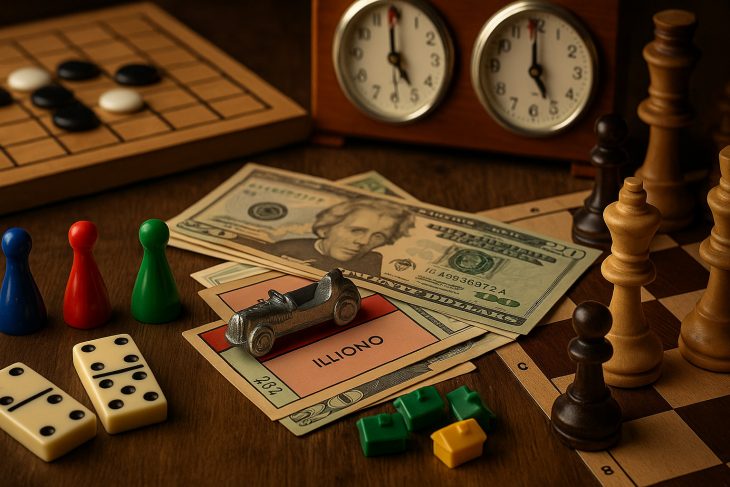
Board games and tabletop gaming have entertained, educated, and challenged people for thousands of years. From ancient relics to modern classics, they span cultures and generations. Why are they so enduring? Their ability to blend strategy, luck, and social interaction makes them timeless pastimes. These facts reveal their rich history and fascinating variety.
The Ancient Origins of Board Games
1. Senet is the oldest known board game.
Dating back to 3100 BCE in ancient Egypt, Senet was found in burial tombs, including that of Tutankhamun.
2. The Royal Game of Ur came from Mesopotamia.
This game dates to around 2600 BCE and used dice-like objects to determine moves.
3. Ancient Romans played Ludus Latrunculorum.
Known as “the game of little soldiers,” it was a strategic military simulation.
4. Mancala originated in Africa.
Thought to be over 1,000 years old, Mancala uses pits and seeds or stones.
5. Backgammon has Persian roots.
It evolved from the game Nard, played as early as 3000 BCE.
Game Mechanics and Innovations
6. Dice were among the earliest randomizers.
Ancient dice have been found worldwide, including knucklebones used as early dice.
7. Dominoes trace back to China.
Invented during the Song Dynasty (960–1279), they later spread globally.
8. Chess came from India.
It originated as Chaturanga around the 6th century CE.
9. Go is older than chess.
This Chinese game dates back more than 2,500 years and is known for its depth despite simple rules.
10. The chess clock was introduced in 1883.
Used in competitive chess to prevent stalling and add urgency.
Modern Board Game Milestones
11. Monopoly was inspired by The Landlord’s Game.
Elizabeth Magie created it in 1904 to illustrate economic principles.
12. Scrabble was invented during the Great Depression.
Alfred Butts designed it in 1938 to combine chance and skill.
13. Risk introduced global conquest gameplay.
First released in France as La Conquête du Monde in 1957.
14. Settlers of Catan sparked a board game renaissance.
Released in 1995, it popularized resource management mechanics.
15. Ticket to Ride has sold millions worldwide.
This 2004 game’s simple railroad-building concept attracted a broad audience.
Cultural Influence and Popularity
16. Board games were used for education.
Ancient games taught math, war strategies, and cultural values.
17. Board games feature in religious rituals.
Senet was thought to help guide the dead through the afterlife.
18. Board game cafés have surged in popularity.
Cities worldwide now offer spaces for players to meet and play.
19. Japan’s Shogi adds captured pieces back to play.
This feature adds depth and unpredictability not found in western chess.
20. Ludo is based on an ancient Indian game.
Pachisi, also called “Twenty-Five,” was a royal pastime before being adapted for Western audiences.
The Rise of Tabletop Gaming
21. Tabletop role-playing games (TTRPGs) began in the 1970s.
Dungeons & Dragons, launched in 1974, became the flagship of this genre.
22. Miniature wargaming predated TTRPGs.
H.G. Wells’ Little Wars (1913) outlined rules for toy soldier battles.
23. Pandemic pioneered cooperative play.
Matt Leacock’s 2008 game requires players to work together to stop global outbreaks.
24. Eurogames offer low randomness.
Games like Carcassonne and Agricola focus on strategy over luck.
25. Modern games cater to solo players.
Titles like Mage Knight and Friday provide deep single-player experiences.
Fun and Unexpected Facts
26. Board games boosted creativity during lockdowns.
Sales surged worldwide as people sought home entertainment.
27. Candy Land was invented to entertain sick children.
Eleanor Abbott created it in the 1940s for polio patients.
28. Clue originated in wartime Britain.
Anthony Pratt designed it in 1943 to simulate murder mystery parties.
29. Game pieces have symbolic meanings.
In Monopoly, the original pieces included a battleship and top hat, reflecting the 1930s culture.
30. There are board games for every niche.
From farming simulations to horror storytelling, no theme is too obscure.
The Enduring Allure of Board Games
Board games and tabletop experiences continue to thrive because they connect people face-to-face. Whether tracing strategies on a Go board or collaborating to defeat a pandemic, they offer endless variation and social connection. Their history and innovations assure that this form of entertainment remains relevant across all generations.
Was this page helpful?
Our commitment to delivering trustworthy and engaging content is at the heart of what we do. Each fact on our site is contributed by real users like you, bringing a wealth of diverse insights and information. To ensure the highest standards of accuracy and reliability, our dedicated editors meticulously review each submission. This process guarantees that the facts we share are not only fascinating but also credible. Trust in our commitment to quality and authenticity as you explore and learn with us.


